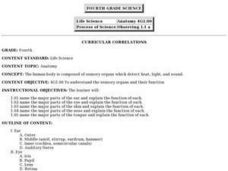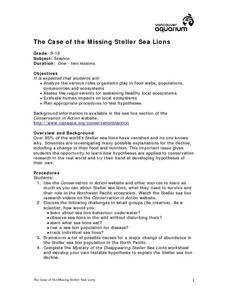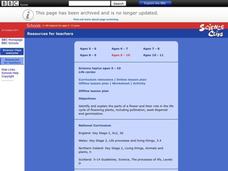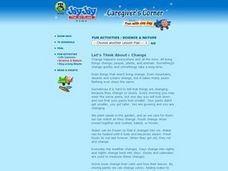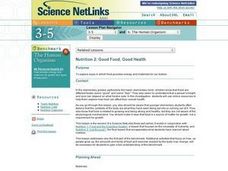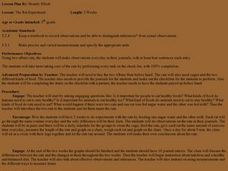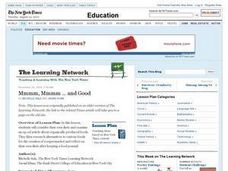Curated OER
Wanted: The Infamous Five
Young scholars name the five most common types of foodborne pathogens. They comprehend how bacteria can grow and spread. Students are taught healthy hygiene and food-safety habits. They discuss the crimes of the five most wanted...
Curated OER
Anatomy
Fifth graders identify and describe the functions of the major body systems. They discover how to maintain a healthy lifestyle with proper nutrition and exercise. They answer comprehension questions to end the lesson.
Curated OER
The Case of the Missing Steller Sea Lions
Students identify and analyze the various roles organisms play in food webs, populations, communities and ecosystems. Students assess the requirements for sustaining healthy local ecosystems. STudents evaluate human impacts on local...
Curated OER
Life cycles
Pupils identify and explain the parts of a flower and their role in the life cycle of flowering plants, including pollination, seed dispersal, and germination. Students recap the following information: that plants need light, warmth, and...
Curated OER
Drink It Up!
Young scholars investigate how the human body needs water by recording their water consumption for a day. They sing a song about drinking water, make and drink Kool-Aid and eat apple slices, and conduct an experiment to determine how...
Curated OER
There Are Algae in Your House!
Young scholars demonstrate that, although we sometimes can neither smell nor taste them, many ingredients in our foods and household products come from the sea. They also investigate food eat to determine algae derivatives they contain.
Curated OER
Nutrition in Space
Students discover the importance of a healthy diet during space travel and examine the physiological changes astronauts experience while in space. In groups, they develop questions to determine an astronaut's food intake and identify...
Curated OER
Teen Health: Talking with Your Doctor
Learners discuss common health care issues they're facing today. In this health science lesson, students explain the benefit of seeking professional help. They write a journal to keep track of their own health issues.
Curated OER
Let's Think About... Change
Students observe various examples of "change." They mix paint to cereate new colors, eat bread and then toasted bread, and match baby pictures with pictures of how the same people look in the present. Finally, they watch a bouquet of...
Curated OER
How Long Until Dirt
Third graders examine the difference between composting and wasting food. They problem-solve what to do about leftovers after lunches so good food doesn't go to waste.They study food storage techniques that are environmentally friendly...
Curated OER
Food Pyramid and Dietary Guidelines
Students examine Food Guide Pyramid and Dietary Guidelines. They look at samples of serving sizes, sort different foods into their correct groups, complete worksheets to discover which types of foods they eat regularly, and discuss...
Curated OER
Essential Nutrients - Daily Guides
List the recommended dietary guidelines and explain their function and implementation. (The guidelines are listed below) National Standards 14.3.1 Aim for fitness Aim for a healthy weight Be physically active each day
Curated OER
Health and Food Safety
Learners discuss ways to keep healthy, and examine factors that influence health, including media. They then participate in mock public meeting on genetically modified foods in order to explore importance of governmental decisions in...
Curated OER
Good Food, Good Health
Students investigate how food provides energy for the human body. In this physical health lesson, students access online resources to identify how certain foods can affect their health. Students discuss how many servings of each food...
Curated OER
A Recipe for Reading: Asian Style Rice and Eggs
Learners read, write about, and cook with rice in this home economics lesson plan. They reflect on the experience eating rice at home or in other ethnic foods.
Curated OER
Food for Thought
Fifth graders explore the brain and what is needs. In this biology lesson plan, 5th graders will work on a series of activities that will allow them to learn about the brain, its parts, and the best foods to eat for their brain.
Curated OER
Gathering, Traditions, and Nutrition of Our Food
Students gain a better understanding of what it means to eat seasonally through learning about traditional hunting, gathering, and food preparation methods of Athabascan tribes. By interacting with Native American Elders and...
Curated OER
What's On Your Plate?
Students keep running record of the activities they engage in and the food they eat. In this lesson on healthy living, students discuss the dangers of anorexia and bulimia, record their activity level and food consumption over the course...
Curated OER
Module 3: "You Have the Power!"
Students explore how to maintain a healthy mouth and how to keep teeth clean. They become aware that brushing with fluoride toothpaste is helpful if done on a daily basis, flossing is important, and eating and drinking nutritious foods...
Curated OER
The Rat Experiment
Fifth graders observe two albino rats and write their observations in a science journal for two weeks. In rotation groups, they complete the necessary tasks to keep the rats fed and clean. They discuss the importance of eating healthy...
Curated OER
3D Food Guide Pyramid
Students create their own 3D Food Guide pyramid. In this health science lesson, students assess their eating and exercise habit. They design a healthy meal plan and exercise to incorporate in their lives.
Curated OER
Primary Resources
In this teacher website, teachers have access to various worksheets and lesson plans at no cost. Teachers can select from all subject areas for lesson plans, activities, and available resources.
Curated OER
Mmmm, Mmmm ... and Good
Students consider their own diets and examine an op-ed article about organically produced foods. They research alternatives to various foods for the creation of a supermarket and reflect on their own diets after keeping a food journal.
Curated OER
Cancer
Students study cancer and possible preventative measures. In this cancer lesson students study the claims on food labels and ways to lower your risk of cancer.



